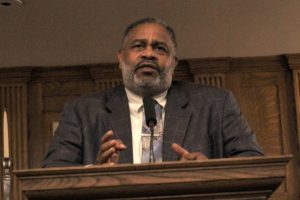Allegheny’s Student Alliance for Prison Reform Hosts Anthony Ray Hinton

Anthony Ray Hinton was released from Jefferson County (Alabama) Jail in 2015 after serving one of the longest sentences on death row among those later exonerated — and since then he has been traveling the country telling his story.
Hinton spoke at Allegheny College on Thursday, Sept. 20, as part of a program sponsored by the national Equal Justice Initiative and Allegheny’s Student Alliance for Prison Reform.
Hinton wrote “The Sun Does Shine: How I Found Life and Freedom on Death Row,” a New York Times bestseller, about his experience.
“I wish I could look you in the eye and tell you that the state of Alabama made an honest mistake,” Hinton told a roomful of Allegheny students and other community members. “I wish I could look you in the eye and tell you that race had nothing to do with me going to death row for 30 years, but the truth of the matter is the state of Alabama didn’t make an honest mistake, and race had everything to do with me going to death row.”
In the summer of 1985, two Birmingham-area fast-food restaurants were robbed and their managers fatally shot. In July, there was a robbery at a restaurant in Bessemer, Alabama, where the manager was shot but not seriously injured.
Though a 29-year-old Anthony Hinton was working at a locked warehouse 15 miles away at the time of the second crime, and although there were no eyewitness accounts of the first incident, he was arrested one evening while cutting the grass outside of his mother’s house. He matched a vague description of the perpetrator, and after being brought into the police station, was identified from a photo lineup.
Hinton was told by the detective handling his case that it didn’t matter whether he did or didn’t commit the crimes. The officer “was going to make sure that [Hinton] was found guilty.”
After illegal seizure of a firearm that had been in Hinton’s mother’s possession, the state of Alabama claimed that the gun matched the one used in all three crimes, and lacking an expert who could sufficiently refute the state’s claims, Hinton was convicted and sentenced to death row. It was here that he spent 30 years steadfastly maintaining that he was innocent, and after more than 12 years of litigation, the U.S. Supreme Court unanimously overturned his conviction, and Hinton was allowed to walk free.
Hinton’s entire family died while he was on death row, and the state of Alabama has yet to issue him an apology or pay him the $3 million he is legally due, he said.
“I go around the country telling this story because I truly don’t want any of you young people to get caught up in a system that is flawed,” Hinton said, emphasizing the importance of young people mobilizing in favor of prison reform, “Your children’s children will inherit this judicial system that we have if you don’t stand up and do something about it.”
Student involvement in seeking improved justice was a frequent theme on Thursday evening, touched on by Hinton himself, by audience members who voiced their questions, and by student organizers of the event. The local Student Alliance for Prison Reform, which is a relatively new group on campus, is part of a larger alliance, spearheaded by Princeton University, which seeks to get students involved in political processes and open dialogue about injustice.
“Mr. Hinton’s story was one that we all found especially compelling,” said the student club’s vice president, Brian A. Hill ’19, “We figured that getting someone who works hand-in-hand with the Equal Justice Initiative would not only serve the purpose of our club, but also have a broader appeal to the campus. Getting Mr. Hinton was a challenge, but it’s a challenge that we’re really proud that we took on.”
The evening concluded with a round of questions, as well as an opportunity for students to talk with Hinton one-on-one. Hinton’s book is being adapted into a movie scheduled to be released in the United States in 2020.